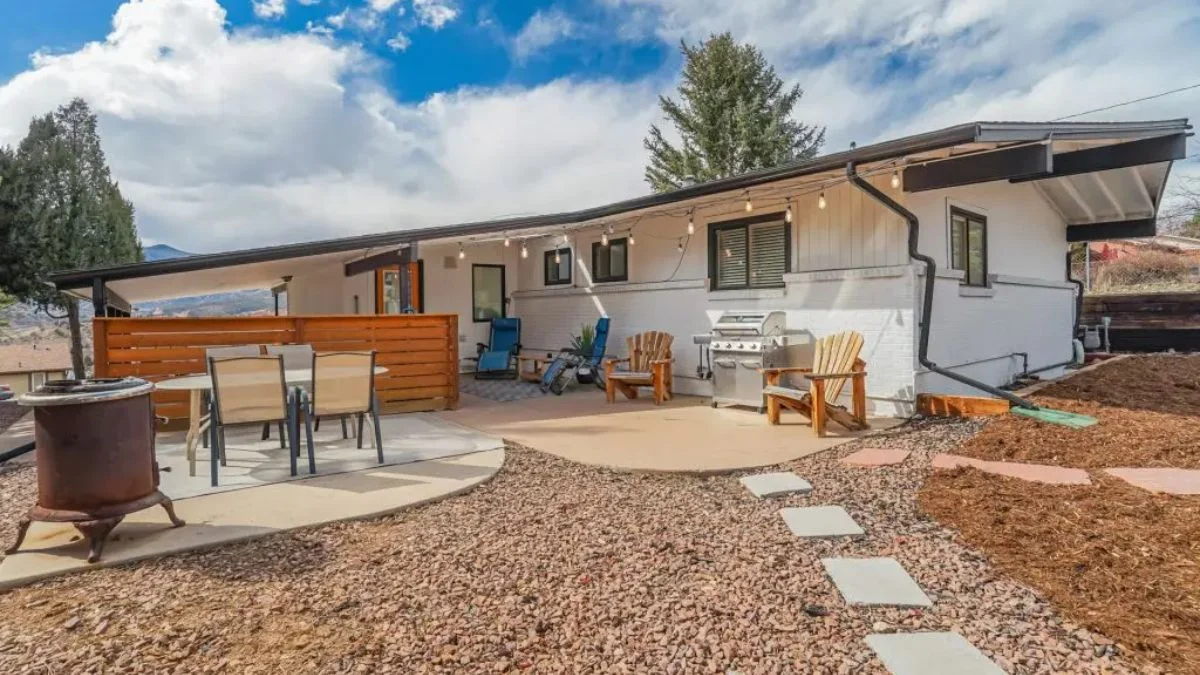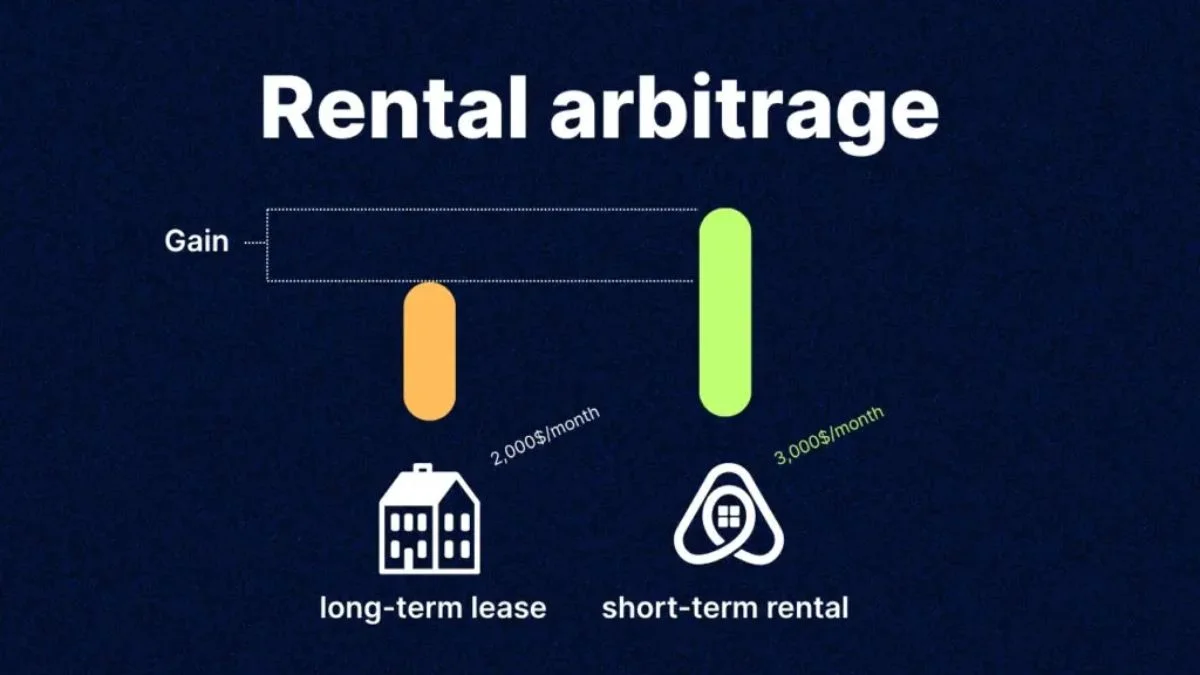Rental arbitrage has become a popular strategy for investors and tenants alike who want to profit from short-term rentals without owning property. But what is rental arbitrage exactly, and how can you do it safely and profitably? This guide explains the concept, highlights pros and cons, and provides practical tips for avoiding common mistakes.
What is Rental Arbitrage?

Rental arbitrage is a business model where an operator secures a property with a long-term lease and then subletting it as a short-term rental, usually through platforms like Airbnb or VRBO. Essentially, you lease a property at a fixed monthly rate and rent it out nightly, earning the difference as profit.
For example, if you rent a 2-bedroom apartment for $1,500 per month and earn $2,500 from short-term guests, your gross profit would be $1,000. But rental arbitrage isn’t risk-free, it requires careful planning, legal compliance, and clear communication with landlords.
So, how does rental arbitrage work?
The process typically involves the following steps:
- Finding a property: You look for rentals that allow subleasing or are flexible with short-term rentals.
- Getting landlord approval: Written consent from the property owner is essential.
- Setting up the rental: Furnish the property, stage it professionally, and create appealing listings.
- Managing bookings: Use Airbnb, VRBO, or other platforms to handle reservations, guest communication, and cleaning.
- Running the numbers: Calculate operating costs, taxes, platform fees, and potential profits.
Some investors expand their portfolios by running multiple properties under this model, creating a passive rental income stream without owning property themselves.
Pros and Cons of Rental Arbitrage
Rental arbitrage presents a unique value proposition for both the operator and the property owner. However, like any investment strategy, it carries distinct advantages and disadvantages.
Pros
- Lower Capital Requirement: Tenants don't need a massive down payment for a mortgage. Initial costs are primarily the security deposit, first month's rent, and furnishing costs - significantly less than buying a property.
- Flexible Portfolio: Different markets or property types can be tested without the long-term commitment of a purchase. If a location becomes unprofitable due to new regulations, the lease can simply be terminated without the complications of selling real estate.
- Potentially High Returns: Short-term rental rates often exceed long-term rents, increasing profit potential.
- Scalability: Once a successful system is established, expansion is quickened by signing new leases, making it easier to grow the business than by buying properties one by one.
Cons
- Legal Risk: Some cities have strict short-term rental regulations.
- Landlord Restrictions: Not all leases allow subletting or short-term rentals.
- Operational Complexity: Managing bookings, cleaning, and guest issues requires time or hiring a property manager.
- Profit Variability: Seasonal demand, platform fees, and market changes can affect income.
Who Is Rental Arbitrage For?

Rental arbitrage is best suited for two types of people, each with a different role:
- Aspiring real estate investors who want exposure to short-term rentals without owning property.
- Entrepreneurs seeking additional income streams.
- Individuals skilled in property management and hospitality.
- Tenants in landlord-friendly states who can negotiate lease terms.
It may not suit those unwilling to handle operational responsibilities or navigate complex local regulations.
10 Common Mistakes to Avoid in Rental Arbitrage
The path to success in short term rental arbitrage is littered with pitfalls. The difference between a profitable side hustle and a costly failure often comes down to avoiding these common and often career-ending mistakes.

1. Skipping Landlord Permission
One of the most common mistakes beginners make is assuming that a lease automatically allows subleasing for short-term rentals. This can be a serious legal risk. For example, if your landlord finds out that you are renting the property on Airbnb without consent, they can terminate your lease, evict you, and even take legal action for damages.
Tip: Always obtain written consent from your landlord. Include specifics such as duration of subleasing, number of allowed guests, and responsibilities for maintenance. You can even link it to a professionally drafted online rental contract to protect both parties.
2. Ignoring Local Short-Term Rental Laws
Every city has its own rules. In New York City, short-term rentals under 30 days are largely prohibited unless the host lives in the unit. In San Francisco, hosts must register with the city and follow strict occupancy limits. Ignoring these regulations can result in fines of thousands of dollars or forced shutdowns.
Tip: Research your local municipality before investing. Some areas allow short-term rentals only for specific zones or with a business license. Tools like city websites and local real estate boards can provide up-to-date guidance.
3. Assuming All Leases Allow Subletting
Not all leases are created equal. Some leases explicitly forbid subleasing, while others require landlord approval. Even if subleasing is allowed, there may be restrictions on short-term rentals.
For example: A standard lease might allow a tenant to sublet for a full year but prohibit daily or weekly rentals through platforms like Airbnb. Ignoring this distinction could lead to breach of contract.
Tip: Review your lease carefully, and if unclear, consult a lawyer or check guidelines on what a landlord cannot do.
4. Not Registering or Getting the Right Licenses
Many cities require formal registration or licensing for short-term rentals. Failing to obtain these licenses is a legal misstep.
For example: In Los Angeles, a short-term rental business without a valid registration can face fines up to $500 per day. Similarly, Miami-Dade County requires a local business tax receipt and state registration.
Tip: Keep copies of all registrations and licenses, and renew them promptly. Check your municipality’s requirements annually, as rules can change.
5. Underestimating Furnishing & Setup Costs
A major expense in rental arbitrage is furnishing the property to meet short-term guest expectations.
Breakdown of typical costs for a 2-bedroom apartment:
- Furniture: $2,000–$4,000
- Bedding & linens: $300–$500
- Kitchen supplies: $200–$400
- Décor and lighting: $500–$1,000
- Cleaning and initial stocking: $200
Tip: Treat furnishing as an investment. A well-furnished property can increase nightly rates by 20–30% and improve guest reviews, leading to higher occupancy.
6. Choosing the Wrong Location
Even if the property is perfect, a poor location can doom profitability. High tourist demand, business travel, and accessibility are crucial factors.
For example: A centrally located apartment in a city like Orlando can achieve 75–80% occupancy year-round, while a similar property in a remote suburb may only reach 40%.
Tip: Analyze market data using tools like AirDNA or Mashvisor. Also, consider proximity to public transport, restaurants, and tourist attractions.
7. Failing to Calculate All Operating Costs
Operating costs can eat into profits if not calculated accurately. Common overlooked expenses include:
- Utilities (electricity, water, internet)
- Platform fees (Airbnb charges ~3% for hosts, VRBO up to 10%)
- Cleaning and maintenance
- Taxes (local occupancy taxes can be 5–15%)
- Insurance and liability coverage
Tip: Create a detailed budget that separates fixed costs (rent) and variable costs (cleaning, repairs).
8. Overleveraging Too Early
Scaling too fast is a common pitfall. Beginners often take on multiple units before understanding occupancy trends, costs, or guest management.
For example: If you rent three apartments expecting $2,000 monthly profit each, but actual occupancy is lower and unexpected repairs arise, you could face a cash flow crisis.
Tip: Start with one unit, optimize operations, and only expand after consistently profitable months. Use income verification and cash flow reports to plan scaling safely.
9. Ignoring Airbnb or Platform Policies
Airbnb, Vrbo, and other platforms have their own rules. They can suspend a listing or even an entire account for low ratings, too many cancellations, or using outside payment methods. Account suspension means zero revenue.
Tip: Stay updated on platform updates and maintain excellent guest communication to avoid penalties.
10. Skipping Insurance or Legal Protection
Many tenants assume renters’ insurance is enough. However, most standard policies do not cover short-term rental activities.
Tip: Consider:
- Short-term rental-specific insurance
- Landlord insurance to protect the property and lease
- Liability coverage to protect yourself from guest accidents
Failure to secure insurance can result in out-of-pocket expenses for damages, theft, or liability claims.
How to Do Rental Arbitrage Legally and Safely?

Mastering rental arbitrage requires diligent compliance, robust preparation, and professional execution. The following steps lead to building a sustainable and legal business.
1. Obtain Written Landlord Consent
This step is non-negotiable. The agreement must be in writing. An offer of a lease addendum that clearly:
- Grants the tenant/operator permission for short-term rental arbitrage use.
- Specifies the platform(s) to be used (e.g., Airbnb, Vrbo).
- Details who is responsible for utilities, repairs, and common area upkeep.
- Includes a clause that the operator maintains the required commercial insurance and names the landlord as an "Additional Insured."
This negotiation is key to demonstrating why would a landlord agree to rental arbitrage, it shows them the operator is a professional, not a casual rule-breaker.
2. Comply with Local Regulations
Register your property, obtain required permits, and follow city laws:
- Check Zoning: Ensure the property's zone permits short-term rentals.
- Register & License: All necessary city/county permits must be applied for, and all required transient occupancy and sales taxes collected and remitted.
- Consult Legal Counsel: Because laws vary so widely, consulting a local real estate attorney to confirm compliance in the specific city is highly advisable.
3. Conduct Thorough Market Research
Data-driven tools (like AirDNA or Mashvisor) should be used to determine if a market is truly viable.
- Identify Demand Drivers: Is the demand year-round (business travel, large hospitals) or seasonal (beaches, ski resorts)?
- Analyze Competition: What are other successful listings charging? What amenities are offered? This will guide the pricing strategy.
- Calculate the Premium: Focus only on properties where the potential short-term revenue is at least 2.5 to 3 times the pro-rated daily long-term rent to ensure a sufficient buffer for expenses.
This is a critical part of knowing how to find rental arbitrage properties that actually produce profit.
4. Run the Numbers Carefully
A detailed, conservative financial model must be created that includes:
- Initial Costs: Deposit, rent, furnishing, licenses.
- Monthly Costs: Rent, utilities (overestimated by 15-20%), cleaning fees, supplies, platform fees, insurance, and property management fees.
- Revenue Projections: An occupancy rate lower than the market average should be used for the first few months.
Remember, is rental arbitrage always profitable? No. Profitability relies entirely on accurate, conservative financial modeling and professional execution. Calculate net rent vs gross rent to understand profitability.
5. Create a Strong Landlord Pitch
A landlord is vetting the operator as a business partner, not just a tenant. The pitch must highlight the benefits for the property owner: steady rent payments, professional management, and property care. Highlight your experience and insurance coverage.
6. Furnish and Set Up Professionally
Invest in high-quality furniture and amenities. The setup dictates pricing power and review score.
- Comfort: Investing in quality mattresses and linens is paramount - guests prioritize sleep.
- Functionality: The kitchen must be fully equipped, and high-speed, reliable Wi-Fi is mandatory.
- Safety: Smart locks, smoke detectors, and carbon monoxide alarms should be installed.
7. Streamline Your Operations
Use property management software, cleaning teams, and automation for guest communication. Efficient operations reduce stress and improve profitability:
- Automation: Dynamic pricing software should be used to adjust rates automatically.
- Guest Experience: A clear digital welcome guide with check-in instructions and house rules is necessary.
- Cleaning Team: Establishing a reliable, professional cleaning team that can execute quick, high-quality turnovers is crucial.
Conclusion
Rental arbitrage offers an opportunity to earn income from short-term rentals without property ownership. However, understanding legality, market dynamics, and operational challenges is essential.
FAQs
Is Rental Arbitrage The Same As Subletting?
Not exactly. Subletting typically refers to renting your own lease to another person. Rental arbitrage involves renting to tenants on a short-term basis for profit, often under a formalized business strategy.
Is Rental Arbitrage Legal?
Yes, if you obtain landlord permission, follow lease terms, and comply with local regulations. Ignoring these can make it illegal.
Should landlords allow rental arbitrage at their properties?
Landlords should evaluate this as a professional business agreement. The decision comes down to risk tolerance and business goals. A landlord benefits from:
- Guaranteed, timely rent.
- Professionally maintained property.
- Outsourced day-to-day management.
If the landlord secures a comprehensive lease with a credible, insured operator and verifies the proper local licensing, allowing rental arbitrage can be a superior financial arrangement compared to a standard long-term tenant. Reviewing an income verification and cash flow report on the operator's business to confirm financial stability is also a prudent step.
Is rental arbitrage always profitable?
Profitability varies. Urban areas with high tourism tend to generate better returns than low-demand regions. Profit depends on occupancy rates, operating costs, and local rules.
Do you need an LLC to do rental arbitrage?
While not mandatory, forming an LLC can protect personal assets, provide tax benefits, and enhance professional credibility. Many investors choose this route to separate business and personal liability.







